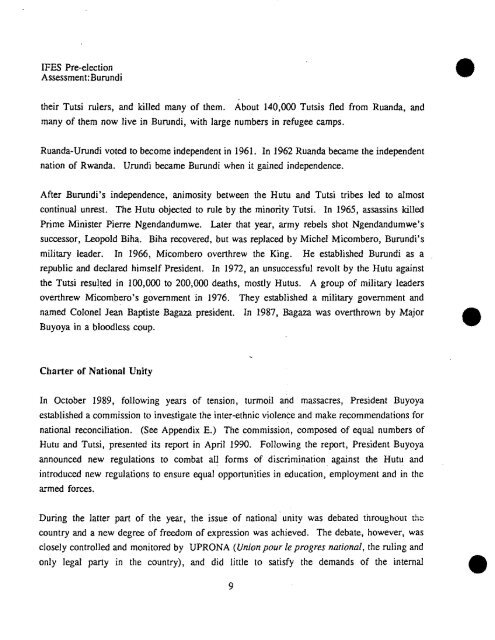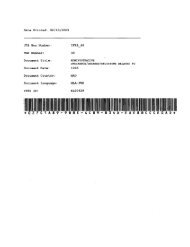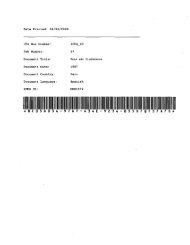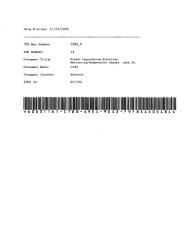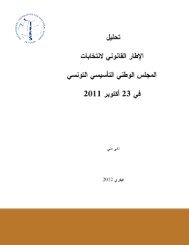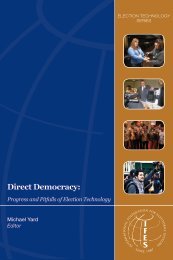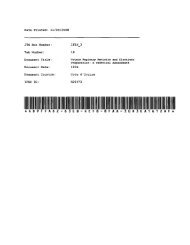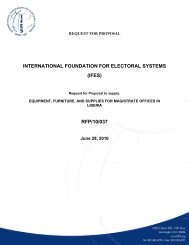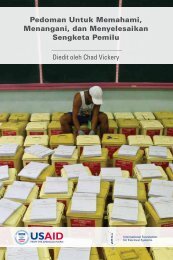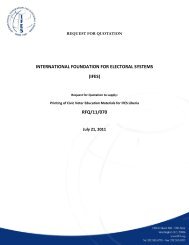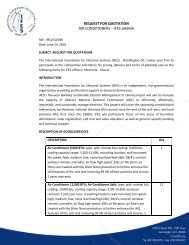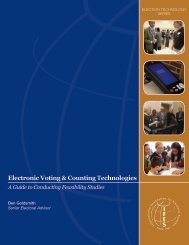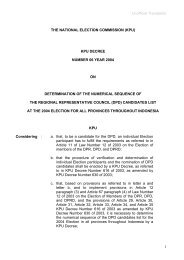- Page 1 and 2: Date Printed: 11/03/2008JTS Box Num
- Page 4 and 5: •TABLE OF CONTENTSEXECUTIVE SUMMA
- Page 7 and 8: EXECUTIVE SUMMARYThe winds of chang
- Page 9 and 10: •IFESPre-electionAssessment:Burun
- Page 11 and 12: IFES Pre-electionAssessment:Burundi
- Page 13: IFES Pre-electionAssessment: Burund
- Page 17 and 18: IFES Pre-electionAssessment:Burundi
- Page 19 and 20: IFES Pre-electionAssessment: Burund
- Page 21 and 22: ill. THE ETHNIC SITUATION IN BURUND
- Page 23 and 24: IFES Pre-electionAssessment: Burund
- Page 25 and 26: •The EconomyIV. EFFECTS OF POLITI
- Page 27 and 28: IFES Pre-electionAssessment Burundi
- Page 29 and 30: IFES Pre-electionAssessment:Burundi
- Page 31 and 32: IFES Pre-electionAssessment:Burundi
- Page 33 and 34: IFES Pre-electionAssessmentBurundiP
- Page 35 and 36: IFES Pre-electionAssessment:Burundi
- Page 37 and 38: VTI. REGISTRATION AND VOTING PROCED
- Page 39 and 40: IFES Pre-electionAssessment: Burund
- Page 41 and 42: IFES Pre-electionAssessment: Burund
- Page 43 and 44: IFES Pre-electionAssessment:Burundi
- Page 45 and 46: IFES Pre-electionAssessment: Burund
- Page 47 and 48: IX. SUMMARY OF RECOMMENDATIONSCivic
- Page 49 and 50: •IFESPre-electionAssessment:Burun
- Page 51 and 52: IFES Pre-electionAssessment: Burund
- Page 53 and 54: •••
- Page 55 and 56: Cu~r1cu1umV1taQFamilY n&melFirst nA
- Page 57 and 58: Biodata, IFES Team, Burundi - 1992R
- Page 59 and 60: Appendix B:List of Persons Intervie
- Page 61 and 62: LANGE,Leonard'"Deputy Chief of Hiss
- Page 63 and 64: •••
- Page 65 and 66:
REPCBLIQUE DU BURUNDICOMMISSION CON
- Page 67 and 68:
.'e S'il est vrai que la population
- Page 69 and 70:
25De 1916 a 1923, Ie Burundi est pl
- Page 71 and 72:
27Laexecutif,A appartient., legisla
- Page 73 and 74:
37Problemes lies a la democratisati
- Page 75 and 76:
1 16Quatrieme chapitreDEMOCRATISATI
- Page 77 and 78:
118II est a rernarquer que malgre I
- Page 79 and 80:
D. Impact du systeme multipartiste
- Page 81 and 82:
, .122Comme cela a ete dej~ dit, le
- Page 83 and 84:
124Constitutionnelle propose que 1'
- Page 85 and 86:
•••
- Page 87 and 88:
I .f .e!!,ii.,~;,ft~efr{,·IBWIRIZW
- Page 89 and 90:
II,lI .;,•i1i!I N TAN GAM A R A R
- Page 91 and 92:
2a-aaucI ", !I ,,11 ,ii1If1t;Inging
- Page 93 and 94:
eut.:reIngingo ya 9Ibwirizwa ni ryo
- Page 95 and 96:
Ingingo ya 17Article 17;. 2.;- etln
- Page 97 and 98:
::anCeestt. desetereIt le,t desurli
- Page 99 and 100:
:.t de~ment,:' des~.ne s::lrnent~rn
- Page 101 and 102:
~ro-:-'so~-:u de:..:tione'oi ts~ se
- Page 103 and 104:
, de::'::m,3.pi1.~cteJienIngingo
- Page 105 and 106:
sont:a:io-.::: s :~.fon;onned'un:
- Page 107 and 108:
. deaudeuxrite ~-~ripas, il'i de"on
- Page 109 and 110:
:--oupe de'",:x-memes:i:Jns de~'eli
- Page 111 and 112:
Ingingo ya 77Article 77,..:oliquest
- Page 113 and 114:
: e :: elngingo ya 82Article 8
- Page 115 and 116:
=;:~t.e;:·e!.1::-xpe-,-~:1tes;::'u
- Page 117 and 118:
5eil desegat.ion,. .. de 1a:n erdre
- Page 119 and 120:
on eli?Cu t ion,_nsetre:rs po':":
- Page 121:
~evoird'un•uventrchesjugesvotesle
- Page 124 and 125:
Ibwirizwa ni ~yo ryereka~auko ~mwak
- Page 126 and 127:
~:'sab·..,;e nl2.:;are~ba ':~a Kab
- Page 128 and 129:
lngingo ya 127Abagize lnama Nshinga
- Page 130 and 131:
~~~~~~~:=: - ~~ha~ba\'e "'Wbt.:::i~
- Page 132 and 133:
Ingir.go ya 139Article 139,,", ,,~
- Page 134 and 135:
....c3.kira ::::ao:.a ::isambu::waz
- Page 136 and 137:
lngingo ya 151Article 151':"J".. ~-
- Page 138 and 139:
-; SentarE Nkuru y'Ubutungane3. De
- Page 140 and 141:
Ingingo ya 162Abagize 1nam2 Nkuru y
- Page 142 and 143:
Ingingo 'ya 169Ibwirizwa ni ryo rye
- Page 144 and 145:
X I IIVYEREKEYE INZEGO Z'INTANGODES
- Page 146 and 147:
;~ik:"::~·;agL.:s:-::'~:a~:;.:;ke:
- Page 149 and 150:
Appendix E:Rappon de Za Commission
- Page 151 and 152:
Ressources agricoles principales pa
- Page 153 and 154:
•Avant -proposNous voudrions empr
- Page 155 and 156:
1619 _vant -proposrdles nous interp
- Page 157 and 158:
Avallt -propos 2223 Ae·proposaulor
- Page 159 and 160:
Appendix F:Chane de [,Unite Nationa
- Page 161 and 162:
NDUS PEUPLE BURUNDAIS.1Forts- de no
- Page 163 and 164:
engager et qGe la victoire est A no
- Page 165 and 166:
5Les E:arund i ont tisse des 1 i en
- Page 167 and 168:
7NOLis reprouvans l'effusion du san
- Page 169 and 170:
Nou's rec:onc:i 1 i er avec: nous-m
- Page 171 and 172:
·1 1publiques doivent avoir une co
- Page 173 and 174:
13protegee et· respectee dans son
- Page 175 and 176:
La culture nationale.Le destin de I
- Page 177 and 178:
•••
- Page 179 and 180:
·'..,..,tt"REPUBLIQUE DU BURUNDICA
- Page 181 and 182:
- 2 -Deuxiememen·t, nous voudrions
- Page 183 and 184:
- .; -C'est donc une periode l'on n
- Page 185 and 186:
- 6 -Monsieur le-Premier Ministre,l
- Page 187 and 188:
Appendix H:Electoral Law and Ordonn
- Page 189 and 190:
B.O.IJ. n-6 nlo1.. ;:.{lion des art
- Page 191 and 192:
B.O. B. n' 6/&4.compo~e d.'un Pr6id
- Page 193 and 194:
aO.Ii. n' 6/84244teua pC5c.nt~. t;:
- Page 195 and 196:
.. -. :..:, .:B.O.B. n° 6/84Ell, d
- Page 197 and 198:
B.O.B. n" 6/84.~S~clion S.Dt. Infra
- Page 199 and 200:
B.0.8 II' 6/'d4ACI. 112.Lcfl\.lw.::
- Page 201 and 202:
Ii.O. B. n" 6/'iA25211 PCU! nOlummc
- Page 203 and 204:
B.O.B, r.. 6/b4dS~ctio 11 9,iniUmnj
- Page 205 and 206:
hLPUaLlOUE DU BURUNDIHlNISTElIE DE
- Page 207 and 208:
Article 7 :Le bulletin de vote depo
- Page 209 and 210:
_... ,'... ~'"Article 18 :Ce dernie
- Page 211 and 212:
4!J.n mil neu1' cent ~uatr~ dDuze ,
- Page 213 and 214:
Ii- 'If YO' E' X E-~OCES ,., v=:aML
- Page 215 and 216:
'-__HINISTERE DES REL:.TIONSEXTERIE
- Page 217 and 218:
Article 911 est cree un Cornite Ele
- Page 219 and 220:
mx:ES-Vl:l£'\I.. 0 'Q..NOOtlR£, r
- Page 221 and 222:
Fait a B~j"""bura. le;if Fevrier 19
- Page 223 and 224:
•••
- Page 225 and 226:
REPUBLIOUE DU BURUNDICABINET 'DU PR
- Page 227 and 228:
41'Article 5Dans leur creation. leu
- Page 229 and 230:
Article 16Dans Ie cadre de leur obj
- Page 231 and 232:
Titre 111 -DE LA PROCEDURE D'AGREME
- Page 233 and 234:
Article 30La decision du Ministre a
- Page 235 and 236:
11 est inlerdil aux pal-lis poliliq
- Page 237 and 238:
sur demande icrile adressie au Mini
- Page 239 and 240:
Article 61.Sans prejudice d'aulres
- Page 241 and 242:
Titre VI I IDU COMITE DE CONCILIATI
- Page 243 and 244:
! .~ Article 76La presente loi entr
- Page 245 and 246:
Appendix J:Deerer sur La Presse
- Page 247 and 248:
:::'cl~ .;: Sa.."1S ?:"ejudic2 des
- Page 249 and 250:
4) l' ac.:--25se cc,7,?le~~ c:..1 S
- Page 251 and 252:
"23dep·')t legc::l ce c..;'.,..;.x
- Page 253 and 254:
,-e (Je::-ant ou 1"- c1i::-~ct"ur d
- Page 255 and 256:
••
- Page 257 and 258:
DEMAND:: D'ASSISTANCE A L'ADRESS::
- Page 259 and 260:
'.,S:':C?£TAR!AT DE LA CO~ISSION N


